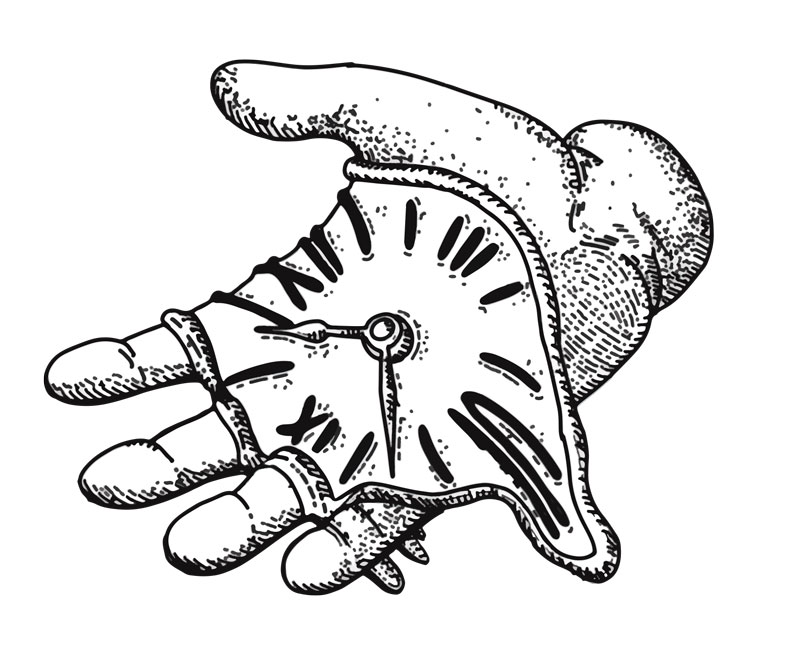Do you have a “bread” or “soup” approach to time?

“Most of the Time Management solutions, tools and techniques work against human
Alec Mackenzie in his book The Time Trap.
nature; people are just not as self-disciplined as we theorists thought.”
Interesting thoughts, which are supported by the experiences of many of us as we wrestle with the challenge of how to get a growing number of things done within a seemingly smaller amount of time.
Managing our time is not about time; we all have the same amount in a day, a week or a year. Nor is it about management; we can’t control time. Time management is about choice and about us as individuals. How we choose to spend our time will determine the results we get. But we won’t all make the same choices! Why? Read on!
How are you with time?
Different people perceive time differently. To some of us time is a finite, measurable, tangible commodity. Like a loaf of sliced bread, it can be shared around very simply and specifically. To others time is a much less tangible item. In fact, it is more like a large bowl of soup, difficult to divide according to any set of rules and difficult to distribute evenly.
To determine your inclination towards bread or soup, tick the characteristics below that best describe your approach to time.
- Can be unstructured
- Focused on tasks and results
- Responsive to what’s going on
- Can become frustrated with chaos or the unexpected
- Strong on relationships
- Prefer to complete one task before starting another
- Can lose focus on the important tasks, while busy on interruptions
- Can measure progress on a task
- Can multi-task readily
- Take a structured approach to work
- Find it difficult to measure a day’s achievement
- Stay on track easily
- Enjoy finding new ways of doing things
- Can be inflexible
Now count the ticks for the even-numbered statements
This is your preference for the “Bread” approach to time ___
Count the ticks for the odd-numbered statements
This is your preference for the “Soup” approach to time. ___

Here is some more information to help you understand how you approach time and how you could make better use of the time you have.
The Bread Approach
Useful Qualities
- Structured and logical
- Do things in a step-by-step way
- Plan and stick to the plan
- Tend to be pro-active
Potential Drawbacks
- Can be inflexible or rigid
- Dislike interruptions
- May prefer to be doing a small number of tasks at once

Development Strategies
- Learn to say “Yes” to interruptions
- Allocate some “chaos” time in the day
- Be prepared to help others to get their work done
- Chill out and go with the flow
The Soup Approach

Useful Qualities
- Don’t need a lot of structure
- Do things as they occur
- Happy working on many tasks simultaneously
- Tend to be responsive
Potential Drawbacks
- Can be scattered and get swamped by too many tasks
- Accept interruptions too readily
- May tend to take on too many tasks at once
Development Strategies
- Learn to say “No” to interruptions
- Set goals based on outcomes, rather than time
- Use a diary to keep focused on the important activities
- Focus on getting your own work done as well as helping others
Timely Tips
Whichever your preference, here are some more tips that will save you time. Choose two or three and practice them until they become a habit.
- Do jobs at the times when you’re at your best for them
- Keep asking yourself “Is this the best use of my time right now?”
- Rather than prioritising tasks, prioritise the outcomes of the tasks
- Ask yourself “Am I the only person who can do this?”
- Remember when you say “YES” to something, you’re saying “NO” to something else
- Check whether you are allocating your time according to your head or your heart
- Divide a large task up into manageable sections and do them one at a time
- Measure Urgency and Importance when setting priorities
- Use “To Do” lists showing the duration, due date and priority of the task
- Estimate based on “Most Likely” size of a task rather than “Best Case”
- Use the BLF approach (Big Lumps First!)
- Focus on one task at a time; remind yourself that you will get to the others
- Fix the cause of a problem rather than the symptoms
- Schedule admin, planning, meeting preparation and meeting follow-up
- And when you’re making choices about your use of time:
- Notice the approach you’re taking, is it bread or is it soup?
- Remember that your perception of time may be different to other people’s.
- Consider the effect of your use of time on you, your family, your friends or your team. Are you getting the results you want? Are they getting the results they want?
And when you’re making choices about your use of time:
- Notice the approach you’re taking, is it bread or is it soup?
- Remember that your perception of time may be different to other people’s
- Consider the effect of your use of time on you, your family, your friends or your team. Are you getting the results you want? Are they getting the results they want?
– Words by Dave Burton, Potential Developer
Art by Lucas Rocha






